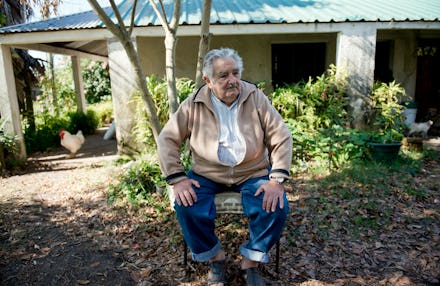Uruguay Takes Another Big Step on Marijuana Legalization That America Should Learn From

The news: Uruguay, the first country to legalize the production and sale of marijuana, will allow doctors to prescribe cannabis to treat certain kinds of medical conditions and symptoms of disease, including chronic pain.
"It will mainly be used to alleviate pain, as in the case of cancer, as well as convulsions or epilepsy," Minister of Health Susana Muniz told Reuters.
How we got here: Marijuana is already well on its way to a complete, government-run market, where two to six licenses licenses to grow up to 10 tons of marijuana annually will be awarded in the near future. The pot will be grown on land guarded by the military, and the price for everyday Uruguayans will start at around 20 pesos (around $0.87) a gram.
Citizens will be able to grow up to six plants at home and produce up to 480 grams a year, and "cannabis clubs" of up to 15-45 members will be legal. Consumers at state-run pharmacies will be restricted to purchasing 40 grams (just over a third of an ounce) a month. Uruguay is considering allowing patients with prescriptions the option to purchase more.
According to the government, the system will undercut illegal marijuana distributors by introducing a cheaper, tightly regulated supply chain. Bags of marijuana will be bar-coded, while the genetic information of plants will be kept on file to prevent illegal weed from entering the open market.
Those buying legal weed will need to enter their fingerprints into a nationally tracked database. And, by the way, Uruguayans will only be able to choose among buying marijuana at a government store, growing their own or joining a club. Furthermore, it will be illegal to "smoke, leave lit, consume or ingest cannabis or cannabis-based products during work hours." That makes Uruguay's plan far more restrictive than, say, the state of Colorado's — where you can buy 28 grams at a time.
But no one will be imprisoned for any of these violations, instead facing a fine of 50-2,000 pesos ($2-$87 dollars) and potentially being expunged from the marijuana registry. Even wayward pharmacy owners will only face temporary or permanent shutdowns of their businesses.
"We aren't going to promote smokefests, bohemianism, all this stuff they try to pass off as innocuous when it isn't," Uruguayan President José Mujica told the Associated Press. "They'll label us reactionaries. But this isn't a policy that seeks to expand marijuana consumption. What it aims to do is keep it all within reason, and not allow it to become an illness."
President José Mujica. Image Credit: AP
Why you should care: Compared to Uruguay's massive step into fully legalized marijuana, adding it to the list of medications available for prescription by doctors might seem downright piddly. But it's nonetheless another humanitarian step as governments reconsider draconian drug laws that have imprisoned hundreds of thousands of people and wasted billions of dollars.
Medical marijuana has become so uncontroversial that the House of Representatives recently moved to block the DEA from enforcing drug laws in states where it's legal. And Slate's Josh Voorhees predicts that marijuana legalization is not only inevitable, it's likely to outpace even the relatively rapid turnaround in opinion among national legislators.
And such reform couldn't come soon enough. In the U.S., around 750,000 people were arrested for marijuana-related offenses in 2012, or around 48.3% of all drug arrests.